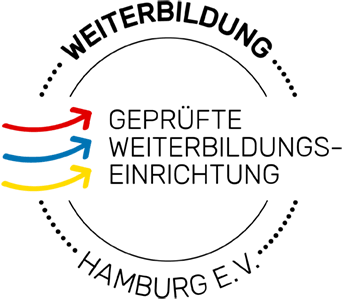The quality of the educational program of Hamburg Coding School is our first priority. It is our goal to provide the best possible learning experience and a most effective knowledge transfer to our customers.
Mission Statement
We created this quality standard as a guideline for implementing all necessary steps to achieve our mission. The main points can be summarized as this:
- Practice-oriented hands-on training
- Student-centered teaching
- A supportive learning environment
- Classes of small size
- Continuous individual support
- Support with career change
Our Vision and Core Values
Learning how to code can be a true challenge, especially for someone with little prior knowledge. There is a great amount of content to be learned and a whole new vocabulary to be mastered. The sheer amount of technical terms that a new learner has to grasp can be daunting, and cryptic errors or bugs can lead to a high level of frustration.
Currently, most educational opportunities have a focus on either self-learning methods (i.e. online courses or tutorials), or teacher-centered teaching as is common at school, at university or in so-called coding boot camps.
Both research and our experience tell us that these learning methods are less than optimal for knowledge transfer in technical topics such as coding. In online tutorials, the student is missing a contact person or mentor who can help if one gets stuck. Online courses lack the important feature of class interaction. And in teacher-centered teaching, students miss individual support which can lead to individuals falling behind.
But especially in coding these things are very important. Technical topics are most often very virtual in nature, little tangible and often very complex. For succsessful knowledge transfer the students need personal interaction: classroom conversations, immediate and individual support when errors occur, and collective moments of success.
We have made it our duty to provide exactly this missing element in coding education. We want to offer courses where the class size doesn’t exceed eight students, so that we can guarantee that the trainer can attend everyone. Only then can the trainer react to individual levels of knowledge, problems and questions. We are convinced that technical topics can only be taught successfully if these conditions are met.
Hands-on Student-centered Learning
We put a strong focus on hands-on exercises in our teaching methods. This enables the students to get experience close to real-world industry conditions. As a side effect, they will gain insights that are useful for their professional orientation.
With small manageable exercises we make sure that our students have moments of achievement often and continously. This is important to avoid frustration, which is unfortunatly very common in this topic.
Our trainers conduct classes in a student-centered manner. They provide step-by-step guidance rather than giving a presentation. They give hands-on exercises and tend to each student individually when they solve it.
It is important to us that at the end of the course every student has had success in learning the topic. Our focus is on the student rather than the teacher. If a student didn’t understand something, our duty is not done yet.
A Supportive Learning Environment
A successful learning experience needs social interaction and collective moments of achievement. Our job at Hamburg Coding School is to provide a learning environment where this is possible.
It is important for us that our students feel comfortable in class. Each student should be comfortable asking questions or asking for help. No question should be left unanswered, and no question should be treated as a silly question. On the contrary: students should feel encouraged and entitled to ask as many questions as they like.
Moreover, we encourage students to share their newly learned lessons with the class, to help each other, and to engage in an open dialog in class. At the end of the day, it is not only the technical skills that need to be learned, but also skills of collaboration.
It is our conviction that a posivite collaborative atmosphere creates a classroom dynamic that enables maximum learning success. Ultimately, you will learn best if you are having fun together.
Career Support
Our course is successful if our students make the transition into their new career as software developer. We support this in two ways:
On the one hand we see it as our duty to design our courses in a way that our students will learn precizely the skills that are needed on the job.
On the other hand we will support the student individually with finding a job as a software developer by offering career coaching, mentoring and access to our network.
Our goal is to provide career support in such an effective way that every student who makes use of it gets a job successfully.
Manifesto
It is about the student, not the teacher.
Our classes use student-centered methods, not teacher-centered. This is the primary rule for our courses.
There are no silly questions.
Every student may ask anything. It is no problem to not know something. No question shall be ignored. For the trainer, many questions are an indicator that the atmosphere in the class is optimal.
Be kind to each other.
Trainers, staff and participants are called upon to treat each other with respect. Discriminatory behavior will not be tolerated. In our courses, the Berlin Code of Conduct applies.
Quality Criteria
Staff Requirements
All competencies for course organisation, curriculum maintenance and teaching as well as management are staffed with internal or external personnel.
The director of pedagogy has a certified education and significant experience as teacher for topics such as software development.
All members of the organization can attend the courses of our curriculum for further personal and professional training.
Trainers and staff get a fair and customary salary or fee.
Aptitude of our Trainers
We hire trainers who work as software developers in their main job. They have many years of experience and show the aptitude and talent that is necessary for teaching technical topics.
As admission criteria, each trainer has to pass a test in form of a trial course. In the trial course, they prove their didactic skills and talents.
Each trainer receives a Teacher’s Guide that contains didactic knowledge and guidelines for teaching our courses. In addition, trainers receive further training in monthly trainers’ workshops.
Course Rooms and Equipment
Course rooms need to comply to the requirements of our courses. They need to provide a comfortable, distraction-free learning environment.
Course participants bring and work with their own laptop.
WiFi, a high-resolution projector or screen, adapters, white board, flip chart, paper and pens are provided.
The equipment is checked on a yearly basis. Reported defect or missing equipment will be taken care of immediately.
Target Group
Our main target group is people who already have some secondary education and want to change careers. Participants of our Full-Stack Web Development program are mainly employees who work in their first job. This is why these courses take place in the evenings. The majority of participants is in their late 20s or early 30s, with some younger and older students as well. The goal of taking the course is mainly the ability to switch careers, or to gain new skills for a different position at their current employee.
The Full-Stack Web Development course program with Bildungsgutschein targets people who are currently unemployed. Due to the financial strain, having the possibility of getting grants for taking the course is very important. Classes are scheduled in the mornings, so that it is suitable for young parents. Since the last job may be some time in the past, students get extra practice sessions for getting used to the current technologies.
Transparency of Student Admission
The admission criteria for each course are explained on the course website. Courses often need certain prior knowledge.
All necessary prerequisite skills can be learned in the respective preliminary courses at Hamburg Coding School.
Any doubts or questions can be clarified in our free course consultation.
Avoiding Frustration
We are making our learning objectives explicit and visible for our students, so that students have a point of reference for their progress and set realistic expectations towards the course and themselves.
The trainers are instructed to be conscious about students’ frustration to detect it early and react to it with corrective action.
During class, students get targeted feedback in form of the 5-step model. This learner feedback helps students realize which skills they already mastered or which they need to practice further.
In addition, students are offered multiple ways of giving feedback, issuing complaints or influencing the pace of the course. These ways are:
- A check-in round at the beginning of each session (oral feedback)
- A check-out round at the end of each session (oral feedback)
- Mid-term feedback
- An online form for anonymous feedback (possible anytime)
- Course evaluation form at the end of a course
Check-in and check-out are done during class by the teacher. Feedback forms are checked by the Director of Studies and Customer Support.
Participants can rate the training, the teachers and the course location and amenities. For certain topics, i.e. amenities and equipment, the teacher reports any problems directly, so that it can be fixed immediately.
The course contens are regularly checked and adjusted if necessary. In this way, courses have been added or extended, workshops replaced or removed from the curriculum. Changes in the curriculum usually take 6 to 12 months until in effect.
Course Contents
Curriculum and syllabus are based on technologies that are common in the industry.
The curriculum of our course program is created in consultation with the director of pedagogy.
Course contents are created in consultation with a trainer who is an expert in the respective topic.
Curriculum and syllabus are checked and improved on a yearly basis. This allows us to provide courses that adhere to the state of the art.
The yearly check includes consulting trainers, experts and doing market research.
In addition, our courses are constantly evaluated by student feedback forms and by regular meetings with the trainers. This is used to check if the scope, detail and pace of the course is appropriate.
It usually takes only two months to adjust or replace courses in the curriculum.
Course Materials
For each course, course materials are provided to the students.
An outline and a time table is provided for each course or course program.
For practical exercises and projects we provide sample code in digital form.
Course contents and materials are checked for quality and up-to-dateness in a yearly interval.
Teaching Methods
Classes are usually taught as hands-on workshops, since this has been proven to achieve most learning success.
In this context, we offer a variety of methods, including:
- Check-in and check-out rounds with oral feedback
- Project work
- Team work
- Student presentations
- Project presentations
- Practice-oriented demonstration of new technologies
- Quizzes and “vocabulary training”
- Skill matrix evaluation
- Open Q&A sessions
Didactic Methods
Didactic methods help the teacher structure their lessons and transfer knowledge in the most effective way.
The didactic methods used at our school include:
- Practice of Component Skills and Integration Skills
- The 5-Step Model for targeted Learner Feedback
- Scaffolding (support and providing parts of the solution)
- Context Transfer exercises
- Making Learning Goals explicit
- “Outline and Breakdown” (technique to split tasks and exercises into smaller parts)
- Metacognition skill development
Class Size
Our courses have a class size of up to 8 participants for classroom courses and up to 12 participants for virtual courses.
For exercise-heavy classes in the virtual classroom setting, additional tutors support the teacher so that every student can be tended to individually.
This allows the trainer to tend to every student individually and to make sure that every student can keep pace with the class.
Assessment of Training Success
We use the following methods for assessment of training success:
- Quizzes
- Presentations at the white board or projector
- Test exercises
- Test projects
- Skill matrix evaluation
For the Full-Stack Program, regular one-on-one mentoring sessions ensure the training success of the students and help mitigate problems.
If a student loses pace with the class, they can get an additional one-on-one session with the trainer.
Students can take tests or classes again.
Course List
All information regarding our course offer or the organization is provided on the website.
Information material in print (course program, flyers) refer to the website and provide contact information.
In addition, prospects can get additional information regarding courses, terms and arrangements by contacting the school.
Course Consultation
We offer free individual course consultation to prospects and customers.
The consultation can be done by phone or video chat by appointment.
The consultant has the necessary knowledge to provide guidance and sound advice to prospects.
At the end of a course, participants can get additional consultation for appropriate continuation courses.
Information Events and Trial Classes
We offer information events every quarter. These are small open house events where prospects have the opportunity to see the course rooms, get information about the course program, meet trainers and staff, and participate in a small coding workshop.
Every 6 weeks we offer free trial lessons that give a brief introduction into coding. They also give the participant the chance to see first hand what our courses, teachers, the teaching and our classrooms are like.
Support Service and Personal Contact
Before classes start, participants will get customer information document that includes information about their personal contact, the trainer, course outline, a time table, house rules and a link to the anonymous feedback form.
The personal contact will answer any questions regarding organizational questions, issues or feedback, and can escalate problems to management if necessary.
Participants can use an online form for submitting anonymous feedback or complaints at any time.
Certificates
Participants of the Full-Stack Web Development program get a certificate at completion of the course. The certificate includes information about the number of hours, the course modules, workshops, projects and a grade.
Participants of course modules get a certificate of participation at the end of the course. This contains information about course title, topic, period, number of hours, name of trainer and organization.
Participants of the orientation course get a certificate with a clear recommendation for theire further education.
Participants of Taylored Training get a certificate that includes information about the number of hours, name of trainer and organization and a detailed list of the tought topics.
Participants of the course Programming for Managers get a certificate of completion. This certificate is valid as formality for the Bildungsurlaub (educational leave) at the respective state.
Conditions of Participation
The course Programming for Managers can be booked directly on the website. Participation is open for everyone as long as seats are available.
The booking form contains a link to the Terms and Conditions. Users have to mark a check box to verify that they have read and understood the terms.
The Terms and Conditions can be accessed on the website at any time.
The Terms and Conditions are checked for legal compliance by a lawyer of our legal protection insurance.
Registration for the Full-Stack Program requires the user to go through an application process where their eligibility requirements are assessed and further questions are clarified.
Participation in the Tailored Training requires a personal consultation meeting to create an individual study program. It may happen that certain circumstances make the program impracticable, such as missing qualifications of the participant or missing competencies of the trainer.
Cancellation and Reimbursement
Participants can cancel a booking for free until 14 days before the course starts and will get a full refund.
If a participant cancels a booking after 14 days but before 7 days of the course start, only 50% of the course price will be refunded.
If a participant cancels less than 7 days before the course starts, the booking cannot be refunded. The participation can be, however, transferred to another person.
Payment Methods
We offer the following payment options: bank transfer, SOFORT (Klarna), credit card, and on account.
For the Tailored Training, payment is made on account in monthly installments.
For the Full-Stack Program, a payment in customized installments is possible upon consultation.
Privacy
The protection of data privacy has high priority.
The Privacy Policy is accessible on our website at any time.
Weiterbildung Hamburg e.V.
With our membership in Weiterbildung Hamburg e.V., we have committed to implementing the quality standards of the association.
Since June 2020 we are certified member of Weiterbildung Hamburg e.V.

Last updated: January 5th, 2026

